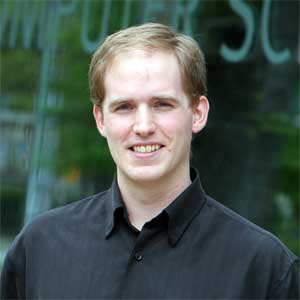 |
| Dr. Robert Beiko is Dalhousie's newest Canada Research Chair. (Pearce photo) |
Robert Beiko is lifting the lid on the bacterial Òblack box.”
That black box may contain the sludge created from human waste, some toxic stew from the Sydney Tar Ponds, or the lively stuff that thrives in our stomachs. Dr. Beiko, DalhousieÕs newest Canada Research Chair, is attempting to understand how these communities of micro-organisms work together and evolve to adapt to their environments.
ÒItÕs an amazingly mystifying question, ÔHow do all these pieces come together to form this new community?Õ” says Dr. Beiko, 30, newly minted Canada Research Chair in Bioinformatics.
Dr. Beiko, Assistant Professor of Computer Science at Dalhousie, was one of 98 recipients across the country to receive research funding in an announcement made last week. His research is also supported by a $23,000 NSERC (Natural Sciences and Engineering Research Council of Canada) grant.
Both biologist and computer scientist, Dr. Beiko examines one or more microbes according to their DNA and protein sequences. It involves taking massive amounts of data Ñ each microbe may have anywhere from 400 to 9,000 genes Ñ and comparing them to the data of other known organisms. Dr. Beiko got his BSc from Dal in 1998 and his PhD in Biology (Bioinformatics) from the University of Ottawa in 2003.
If the challenge of sorting through reams of data isnÕt intimidating enough, Dr. Beiko also looks at the fragmentary information from many, many micro-organisms Ñ Òmetagenomes” or the critters living together in the bacterial black box Ñ and examines them at the same time.
His research will develop sophisticated and efficient computational tools to sort through this growing range of genetic information and to single out rare and useful genes and bacteria. Like the elusive microbe from the Sydney Tar Ponds that munches on toxic PCBs and turns them into something harmless, or the bacterium that pulls phosphorous out of human-waste sludge.
He says Dalhousie is one of the best places in the world to do this kind of research.
ÒWhat really distinguishes Dalhousie is that youÕve got researchers in at least four different departments Ñ Computer Science, Biochemistry and Molecular Biology, Mathematics and Statistics, and Biology and Marine Biology Ñ who are working on the questions posed by molecular evolution.
ÒAnd, with new programs like the Bachelor of Informatics and masterÕs in bioinformatics, we can bring students with all sorts of backgrounds and interests into the field. ThereÕs the potential to involve other scientists and expand the collaborations, which I find really exciting.”
Dr. BeikoÕs appointment brings the number of Canada Research chairholders at Dalhousie to 47; thatÕs more than any other university in the Atlantic region.
The federal governmentÕs Canada Research Chairs Program is the centrepiece of a national strategy to make Canada one of the worldÕs top five countries for research and development. Chairholders advance the frontiers of knowledge in their fields, not only through their own work, but also by teaching and supervising students and coordinating the work of other researchers.
Comments
comments powered by Disqus
